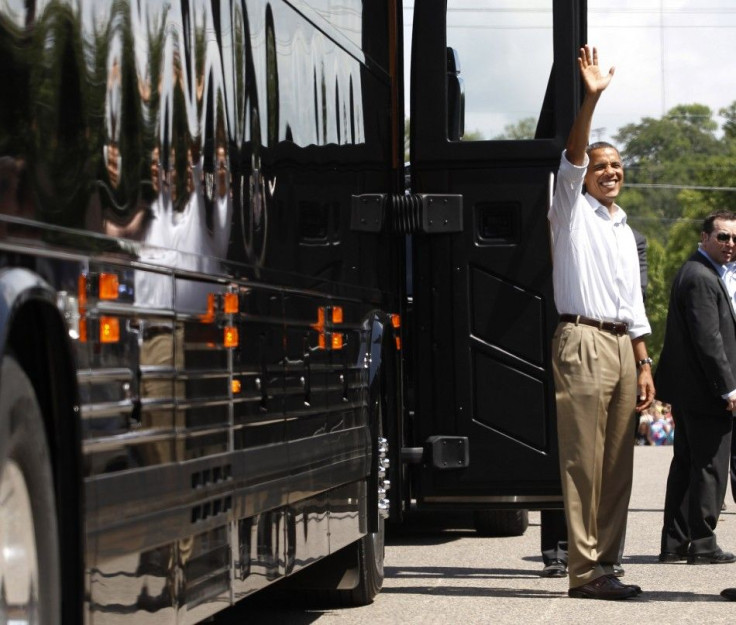Obama to Unveil Economic Plan in September Speech

The White House on Wednesday said President Barack Obama would unveil fresh ideas to jump-start the economy and cut deficits, but details offered so far appeared to be a compilation of old proposals.
Obama faces serious doubts among Americans about his economic leadership and is now trying to convince skeptical voters and Wall Street that he has a workable plan to keep the United States from dipping back into recession.
The White House said Obama will give a speech after the September 5 Labor Day holiday to outline measures to boost hiring and find budget savings that surpass the $1.5 trillion goal of a new congressional deficit-cutting committee.
According to senior administration officials, Obama will renew his call for Congress to extend a payroll tax cut -- a measure the White House says would encourage business to increase hiring but that economists say is likely to make little difference to an economy that is struggling.
The officials said Obama's plan also includes new ideas to accelerate job growth in the short term. The national unemployment rate is stuck above 9 percent, a major impediment to Obama's chances for re-election next year.
The official also said the growth package would include a mix of tax cuts and infrastructure spending as well as some measure targeted at the long-term unemployed. That would likely be a training and education plan.
Obama, who has been criticized in recent weeks by political opponents, allies on the left and Wall Street for repackaging old job-growth ideas, will be under pressure to say something new.
White House officials said no final decisions have been made on what Obama would include in his September speech.
'DROP IT IN THE MAIL'
"We really don't need another speech -- just a plan, like, on paper," said Brendan Buck, spokesman for House of Representatives Speaker John Boehner, on Twitter. "Seriously, just drop it in the mail. Podium not required."
Boehner is the top Republican in Congress.
White House Communications Director Dan Pffeifer said on Twitter the September package would include "meaningful, new initiatives to grow the economy and create jobs" and will also push Congress to act. He gave no details.
Obama also will propose a long-term deficit reduction package based on the $4 trillion deal he tried to broker with Boehner to avert an unprecedented default on U.S. debt obligations, administration officials said.
That agreement would have imposed roughly $3 trillion in spending cuts -- including curbs on social programs such as Medicare, the health insurance program for the elderly -- and $1 trillion in revenue increases, mostly through tax reform.
Those talks failed in July, leading Republicans and Democrats to a lesser agreement that raised the U.S. debt ceiling in time but failed to stop ratings agency S&P from stripping America of its top-notch AAA credit rating.
The agreement created a powerful 12-member congressional panel given the task of finding up to $1.5 trillion or more in savings to tackle the deficit. If it fails to agree on at least $1.2 trillion in savings, automatic spending cuts that hit a wide range of government programs would be triggered.
Boehner and his deputy Eric Cantor signaled they could be open to some of Obama's job growth ideas in an editorial in USA Today newspaper.
"We must dedicate ourselves to pro-growth policies that help create middle-class jobs, make it easier for existing businesses to thrive and allow more start-up companies to flourish," the two top House Republicans wrote.
"This means easing the tax burden on small businesses and removing burdensome, redundant regulations that impede private sector investment and job creation."
But with Republicans intent on making Obama a one-term president, the party may be reluctant to agree to any measures that make the Democratic president more electable.
OBAMA BRUISED
The debt-ceiling battle weakened Obama politically, and he has gotten little lift from his current campaign-style bus tour through Middle America where he has been seeking to convince Americans that Republicans are to blame and he has ideas to create jobs.
But he has little positive news to work with. After avoiding default, S&P downgraded the U.S. rating, the government revised down economic figures to show a highly fragile recovery and global stock markets tanked.
A Gallup poll completed on Saturday showed Obama with a 39 percent approval rating -- the lowest of his presidency.
The Democratic president is widely seen to have few tools left to bolster the U.S. economy and tackle unemployment. His hands are tied by a divided Congress, where Republicans control the House of Representatives and oppose any significant spending measures to stimulate growth.
Obama said on Monday that he would put forward an economic growth plan to address jobs and the deficit when Congress returns from its summer recess. But at the time, he disclosed no details of what the package might contain.
On Wednesday, the president was wrapping up a three-day bus tour through Minnesota, Iowa and Illinois in which he has been repeating well-tread proposals to boost hiring, including free trade bills, payroll tax cuts and highway repair work.
© Copyright Thomson Reuters 2024. All rights reserved.




















